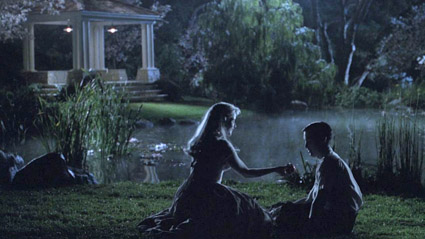 |
| Simple and poignant. |
I loved Guion's wide variety of characters that he managed to create in the novel. He paints each of the eight friends as a notable personality in their own right without having to fall back on hackneyed ways to do so. I also liked the "Island of Misfit Toys" quality they seemed to take upon reflection of how they'd all first became their large group of friends. Guion manages to capture the settings well enough, but truly manages to paint more scenic pictures in certain scenes over others depending upon the character that is narrating and whether they'd notice such things or not--which I thought was a clever and intelligent touch to literally give us not just the settings impartially drawn but also as seen through the bias of the character we were following at that particular moment.
.jpg) |
| The group of friends are much alike the Island of Misfit Toys. |
A tiny little nitpick I have of the novel is that once every thirty to forty pages or so, you'll find a word omitted that should belong in a sentence, a misspelling, or some other minor error. However these things are few and far between, and the novel is all together well edited and laid out.
The only critique I had character-wise was that I really felt I didn't get a chance to know Geoff as a character that well. He seemed to start out well early on in the novel. He held a lot of potential in his own introductory perspective shift, but as the novel develops the rest of the more colourful characters blossom more fully and crowd him out by the end.
The only critique I had plot-wise was the chapter where they all went to visit the character of Josh, who was responsible for the death of Peggy. The situation seemed to me to not have been the best version of that chapter. And by that I mean that I believe a still better version of that scene could possibly exist if teased out a bit more. I can't describe it fully but I can only say that that chapter specifically could have made different dramatic choices that would have really fit it, and the novel better. It's fine the way it is, don't get me wrong, but there's hidden potential there that didn't get fully fleshed out, I feel. And a lot of that has to do with whether information has been earned or worked for--which in other chapters characters are constantly striving to wheedle out of each other information, and when they come to Josh, his enlightened perspective simply just comes too fast and too easily. There is some working for it which Josh employs upon the characters, but it's almost tossed out as a formality instead of a true soul-searching challenge that that moment begs to be.
If literary critic Northrop Frye were still alive today, he'd classify Last Places as a "Second Phase Tragedy", where the heroes and heroines are young people first encountering the realities of adulthood. I'd definitely say it's a decent example of such a story. To quote him:

"The phase is in one way or another the tragedy of innocence in the sense of inexperience, usually involving young people. It may simply be the tragedy of a youthful life cut off. It is dominated by the archetypal imagery of the green and golden world, the loss of the innocence of Adam and Eve, who, no matter how heavy a doctrinal load they have to carry, will always remain dramatically in the position of children baffled by their first contact with an adult situation. In many tragedies of this type the central character survives, so that the action closes with some adjustment to a new and more mature experience." --Northrop Frye
 |
| Living in a green and golden world & losing one's innocence. |
If you ever are able to purchase the novel, I'd highly suggest it. While it has a few flaws, for the large part it is itself a beautifully written young adult novel that I believe is well worth its purchasing price and more. Allow Guion to share with you the memories of good friends, troubled times, and of course last places.
No comments:
Post a Comment